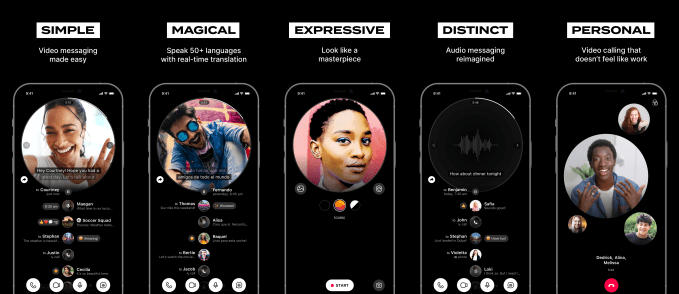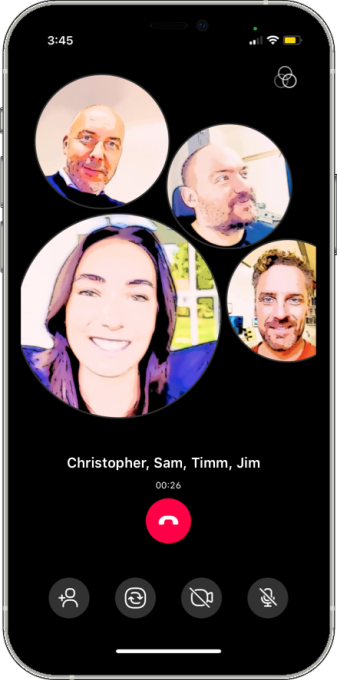A London-headquartered startup called LOVE, valued at $17 million following its pre-seed funding, aims to redefine how people stay in touch with close family and friends. The company is launching a messaging app that offers a combination of video calling as well as asynchronous video and audio messaging, in an ad-free, privacy-focused experience with a number of bells and whistles, including artistic filters and real-time transcription and translation features.
But LOVE’s bigger differentiator may not be its product alone, but rather the company’s mission.
LOVE aims for its product direction to be guided by its user base in a democratic fashion as opposed to having the decisions made about its future determined by an elite few at the top of some corporate hierarchy. In addition, the company’s longer-term goal is ultimately to hand over ownership of the app and its governance to its users, the company says.
These concepts have emerged as part of bigger trends towards a sort of “web 3.0,” or next phase of internet development, where services are decentralized, user privacy is elevated, data is protected, and transactions take place on digital ledgers, like a blockchain, in a more distributed fashion.
LOVE’s founders are proponents of this new model, including serial entrepreneur Samantha Radocchia, who previously founded three companies and was an early advocate for the blockchain as the co-founder of Chronicled, an enterprise blockchain company focused on the pharmaceutical supply chain.
As someone who’s been interested in emerging technology since her days of writing her anthropology thesis on currency exchanges in “Second Life’s” virtual world, she’s now faculty at Singularity University, where she’s given talks about blockchain, A.I., Internet of Things, Future of Work, and other topics. She’s also authored an introductory guide to the blockchain with her book “Bitcoin Pizza.”
Co-founder Christopher Schlaeffer, meanwhile, held a number of roles at Deutsche Telekom, including Chief Product & Innovation Officer, Corporate Development Officer, and Chief Strategy Officer, where he along with Google execs introduced the first mobile phone to run Android. He was also Chief Digital Officer at the telecommunication services company VEON.
The two crossed paths after Schlaeffer had already begun the work of organizing a team to bring LOVE to the public, which includes co-founders Chief Technologist, Jim Reeves, also previously of VEON, and Chief Designer, Timm Kekeritz, previously an interaction designer at international design firm IDEO in San Francisco, design director at IXDS, and founder of design consultancy Raureif in Berlin, among other roles.

Explained Radocchia, what attracted her to join as CEO was the potential to create a new company that upholds more positive values than what’s often seen today — in fact, the brand name “LOVE” is a reference to this aim. She was also interested in the potential to think through what she describes as “new business models that are not reliant on advertising or harvesting the data of our users,” she says.
To that end, LOVE plans to monetize without any advertising. While the company isn’t ready to explain its business model in full, it would involve users opting in to services through granular permissions and membership, we’re told.
“We believe our users will much rather be willing to pay for services they consciously use and grant permissions to in a given context than have their data used for an advertising model which is simply not transparent,” says Radocchia.
LOVE expects to share more about the model next year.
As for the LOVE app itself, it’s a fairly polished mobile messenger offering an interesting combination of features. Like any other video chat app, you can you video call with friends and family, either in one-on-one calls or in groups. Currently, LOVE supports up to 5 call participants, but expects to expand that as it scales. The app also supports video and audio messaging for asynchronous conversations. There are already tools that offer this sort of functionality on the market, of course — like WhatsApp, with its support for audio messages, or video messenger Marco Polo. But they don’t offer quite the same expanded feature set.

Image Credits: LOVE
For starters, LOVE limits its video messages to 60 seconds for brevity’s sake. (As anyone who’s used Marco Polo knows, videos can become a bit rambling, which makes it harder to catch up when you’re behind on group chats.) In addition, LOVE allows you to both watch the video content as well as read the real-time transcription of what’s being said — the latter which comes in handy not only for accessibility’s sake, but also for those times you want to hear someone’s messages but aren’t in a private place to listen or don’t have headphones. Conversations can also be translated into 50 different languages.
“A lot of the traditional communication or messenger products are coming from a paradigm that has always been text-based,” explains Radocchia. “We’re approaching it completely differently. So while other platforms have a lot of the features that we do, I think that…the perspective that we’ve approached it has completely flipped it on its head,” she continues. “As opposed to bolting video messages on to a primarily text-based interface, [LOVE is] actually doing it in the opposite way and adding text as a sort of a magically transcribed add-on — and something that you never, hopefully, need to be typing out on your keyboard again,” she adds.
The app’s user interface, meanwhile, has been designed to encourage eye-to-eye contact with the speaker to make conversations feel more natural. It does this by way of design elements where bubbles float around as you’re speaking and the bubble with the current speaker grows to pull your focus away from looking at yourself. The company is also working with the curator of Serpentine Gallery in London, Hans Ulrich-Obrist, to create new filters that aren’t about beautification or gimmicks, but are instead focused on introducing a new form of visual expression that makes people feel more comfortable on camera.
For the time being, this has resulted in a filter that slightly abstracts your appearance, almost in the style of animation or some other form of visual arts.
The app claims to use end-to-end encryption and the automatic deletion of its content after seven days — except for messages you yourself recorded, if you’ve chosen to save them as “memorable moments.”
“One of our commitments is to privacy and the right-to-forget,” says Radocchia. “We don’t want to be or need to be storing any of this information.”
LOVE has been soft-launched on the App Store where it’s been used with a number of testers and is working to organically grow its user base through an onboarding invite mechanism that asks users to invite at least three people to join you. This same onboarding process also carefully explains why LOVE asks for permissions — like using speech recognition to create subtitles, or
LOVE says its at valuation is around $17 million USD following pre-seed investments from a combination of traditional startup investors and strategic angel investors across a variety of industries, including tech, film, media, TV, and financial services. The company will raise a seed round this fall.
The app is currently available on iOS, but an Android version will arrive later in the year. (Note that LOVE does not currently support the iOS 15 beta software, where it has issues with speech transcription and in other areas. That should be resolved next week, following an app update now in the works.)
from Startups – TechCrunch https://ift.tt/2XY8LCv
Comments
Post a Comment